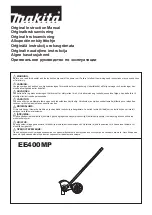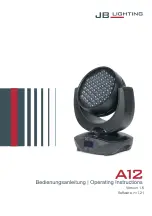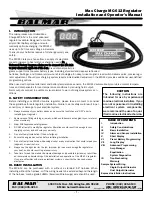
24
Voltage in the system should begin at 0 volts. As the controller bar is slowly actuated, the voltage should gradually increase to
approximately 12 volts, which is referred to as modulation. No modulation means when the controller begins to apply voltage to brakes,
it applies an immediate high voltage, which causes the brakes to apply instantaneous maximum power.
The threshold voltage of a controller is the voltage applied to the brakes when the controller first turns on. The lower the threshold
voltage, the smoother the brakes will operate. Threshold voltage in excess of 2 volts (quite often found in heavy duty controllers) can
cause grabbing, resulting in harsh braking.
How to Measure Amperage:
System amperage is the amperage being drawn by all brakes on the trailer.
The engine of the towing vehicle should be running when
checking amperage.
One place to measure system amperage is at the blue wire of the controller, which is the output to the brakes. The blue wire must be
disconnected and the amp meter put in series into the line. System amperage draw should be as noted in the table below. Make sure
your ammeter has sufficient capacity and note polarity to prevent damaging your amp meter.
Replacing brake magnet:
1. Orient the magnet over the lever arm post such that the magnet leads are in the correct position for routing.
2. Push the magnet over the lever arm post by compressing the magnet spring between the magnet and the lever arm.
3. Insert the magnet clip in the slot of the magnet. Be sure to orient the magnet clip so it will “snap” into place.
4. Press down on the magnet and install the magnet clip.
5. Be sure that the magnet moves up and down freely on the lever arm post.
6. Route the wiring in the same manner noted on removal. Be sure that wires cannot bind, pinch, or rub. Manually actuate lever arm to
ensure there is no interference.
7. Install strain relief bushing, allowing enough slack in the wiring to allow the lever arm to move without straining the wires. Be sure
the wire cannot come in contact with the armature.
8. Connect the magnet leads to the trailer wiring harness and then reinstall hub and drum.
Brake Drum Inspection:
There are two areas of the brake drum that are subject to wear and require inspection. These two areas are the drum surface where the
brake shoes make contact during stopping and the armature surface where the magnet contacts (only in electric brakes).
The drum surface should be inspected for excessive wear or heavy scoring. If worn more than .020” oversized, or if the drum has worn out
of round by more than .015”, then the drum surface should be turned. If scoring or other wear is greater than .090” on the diameter, the
drum must be replaced. When turning the drum surface, the maximum re-bore diameter for a 12” brake drum is 12.090”
The machined inner surface of the brake drum that contacts the brake magnet is called the armature surface. If the armature surface is
scored or worn unevenly, it should be refaced to a 120 micro inch finish by removing not more than .030” of material. To ensure proper
contact between the armature face and the magnet face, the magnets should be replaced whenever the armature surface is refaced and
the armature surface should be refaced whenever the magnets are replaced.
Brakes Service
Brake Size
Amps/Magnet
Two Brakes
Four Brakes
Six Brakes
Magnet Ohms
12 X 2
3.0
6.0
12.0
18.0
3.2
Summary of Contents for Speed Tender Pro
Page 2: ......
















































